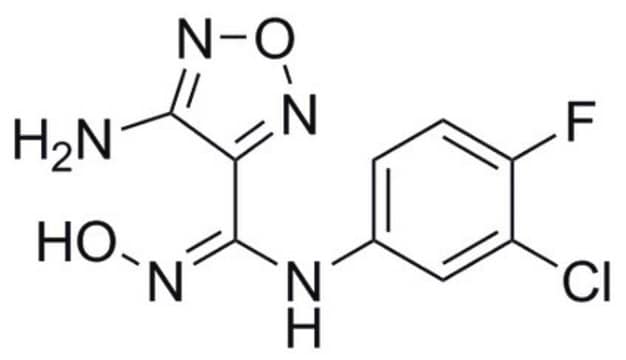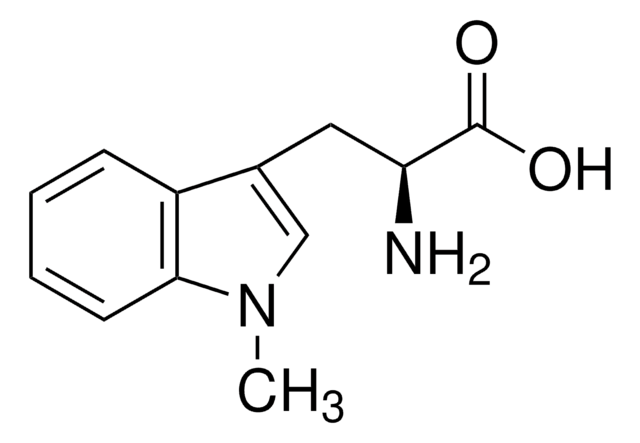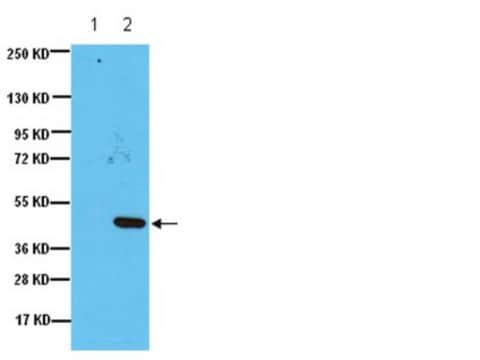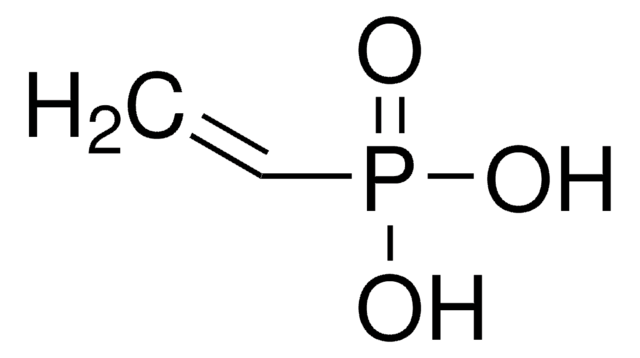Alle Fotos(1)
Wichtige Dokumente
SAE0096
IDO1, human
recombinant, expressed in E. coli, lyophilized powder, His tagged
Synonym(e):
Indoleamine 2,3-dioxygenase 1
Anmeldenzur Ansicht organisationsspezifischer und vertraglich vereinbarter Preise
Alle Fotos(1)
About This Item
Empfohlene Produkte
Rekombinant
expressed in E. coli
Form
lyophilized powder
Spezifische Aktivität
800 units/μg
UniProt-Hinterlegungsnummer
Versandbedingung
wet ice
Lagertemp.
−20°C
Allgemeine Beschreibung
IDO1 is a heme-enzyme that is induced by INF-γ and catalyzes the conversion of tryptophan to kynurenine. This leads to a depletion of tryptophan that results in T cells and dendritic cells inactivation. IDO activity has been identified as an important immune effector pathway in tumor cells to escape a potentially effective immune response. Inhibition of IDO1 has been found to delay cancer growth and enhance dendritic vaccines. Therapeutic inhibition of IDO1 is of interest because of its proposed role in the pathogenesis of several diseases, including cancer, hypotension, neurodegenerative disorders, and its potential to aid cancer immunotherapy and organ transplant.
This recombinant human IDO1 has a 6x histidine tag at its N-terminus. This product is lyophilized from a solution containing 10 mM Trizma buffer (pH 7.0), with 500 mM NaCl and a carbohydrate carrier.
Einheitendefinition
One unit of enzyme hydrolyzes 1.0 pmole of L-Tryptophan to N-formyl-Lkynurenine per minute at pH-6.5 at 37°C
Lagerklassenschlüssel
11 - Combustible Solids
WGK
WGK 2
Flammpunkt (°F)
Not applicable
Flammpunkt (°C)
Not applicable
Hier finden Sie alle aktuellen Versionen:
Analysenzertifikate (COA)
Lot/Batch Number
Die passende Version wird nicht angezeigt?
Wenn Sie eine bestimmte Version benötigen, können Sie anhand der Lot- oder Chargennummer nach einem spezifischen Zertifikat suchen.
Besitzen Sie dieses Produkt bereits?
In der Dokumentenbibliothek finden Sie die Dokumentation zu den Produkten, die Sie kürzlich erworben haben.
Indoleamine 2,3-dioxygenase: is it an immune suppressor?
Sollman, H. et al.
Cancer Journal, 16(4), 354-359 (2010)
Immune-modulating enzyme indoleamine 2,3-dioxygenase is effectively inhibited by targeting its apo-form
Nelp, M.T. et al.
Proceedings of the National Academy of Sciences of the USA, 115(13), 3249-3254 (2018)
Ji-Hee Shin et al.
European journal of nutrition, 59(8), 3591-3601 (2020-02-15)
Growing evidence shows that nutrient metabolism affects inflammatory bowel diseases (IBD) development. Previously, we showed that deficiency of indoleamine 2,3-dioxygenase 1 (Ido1), a tryptophan-catabolizing enzyme, reduced the severity of dextran sulfate sodium (DSS)-induced colitis in mice. However, the roles played
Human bone marrow stromal cells inhibit allogeneic T-cell responses by indoleamine 2,3-dioxygenase-mediated tryptophan degradation.
Meisel, R. et al.
Blood, 103(12), 4619-4621 (2004)
Unser Team von Wissenschaftlern verfügt über Erfahrung in allen Forschungsbereichen einschließlich Life Science, Materialwissenschaften, chemischer Synthese, Chromatographie, Analytik und vielen mehr..
Setzen Sie sich mit dem technischen Dienst in Verbindung.







